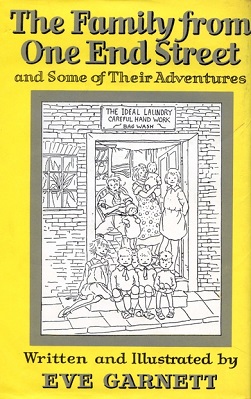Books like The Family from One End Street
The Family from One End Street
Eve Garnett's 1937 novel The Family from One End Street might well read a bit too obviously episodically for those readers who always do desire and crave a specific and mostly straightforward plot line in a novel, and is also and indeed (as well as naturally) an object, a book of its time, of late 1930s England (and as such a time when there was still a very real and palpable societal and cultural attitude of not striving too much to rise above one's supposed station, one's place in a stratified society). And therefore, even though more and more recent literary critics (as well as political activists) have increasingly faulted and even at times actively and vociferously condemned the author for supposedly sporting and promoting a patronising and paternalistic attitude towards the Ruggles (towards the main protagonists of The Family From One End Street), which according to them, to these theorists and activists, is meant to keep the family firmly in place as members of the labouring classes, as members of the so-called working poor, the portraits of the Ruggles family, as presented in The Family From One End Street are all and sundry realistically drawn for and according to the novel's time and its place, from the dialogues, the words uttered by the family to their relationships and antics, their various adventures and numerous varied escapades.Now for our modern sensibilities, The Family From One End Street might very well sometimes feel a bit politically and socially awkward and uncomfortable, but for its time, for 1937, it was indeed and truly an absolute break-through in British children's literature, being one of the very first novels conceptualised for children that did not specifically focus on upper middle and/or aristocratic characters, but on the labouring classes, on a working class family with seven children where the father is a dustman and the mother a washerwoman. And from a historical point of view, Eve Garnett (who wanted with her The Family From One End Street to raise public awareness about what family life, what life in general was like for a large working class family living, existing just above the poverty line) actually did very much succeed with and in her endeavour, even if today's readers might consider especially her tone of narrative voice a bit patronising at times and feel that the presented text is more like that of a distant outsider-narrator and observer looking in, as Garnett herself was of course not of the labouring classes (was upper middle class) and had therefore never experienced poverty or life just above, just skirting the poverty line. However, in my opinion, with Garnett's novel, with The Family From One End Street, the barriers of the working classes not being considered as adequate and as acceptable main protagonists in British children's literature, were definitely even if not right away completely broken, at least rendered more open and as such more probable.And while we as modern and contemporary readers would (and yes even should) of course not be at all surprised at or in any way shocked by presented social and cultural themes such as hand-me-down clothing or issues with worn-out footwear and how to cheaply obtain reasonable replacements if one does not have much disposable cash appearing in children's literature (and while in North America and even in much of continental Europe, children's literature featuring the working classes had in fact been depicted much earlier than the 1930s, at least sporadically), Eve Garnett was definitely and should be much feted as a true United Kingdom pioneer, as one of the very first British children's literature authors to actively and deliberately present the lives and times of the working classes (both realistically and also with a much appreciated sense and dose of humour and adventure, of fun).Now personally, I have found the diverse characters, the episodic adventures of especially the Ruggles' children both authentic feeling and thought/discussion conducing. I have always very much enjoyed reading what I call and label slice-of-life descriptions and depictions, and The Family From One End Street absolutely and glowingly has fit the proverbial bill for me so to speak, presenting a realistic portrait of 1930's England from the point of view of not the upper but the lower echelons of society (a much rewarding and also appreciatively entertaining reading experience, as long as one also strives to remember that the various episodic antics and adventures, the general themes are shown through the filter of the author, of Eve Garnett, who due to the fact that she definitely was of a considerably higher social status than the Ruggles family, than her featured characters, of course lacks the immediacy of personal experience and also does at least sometimes show a perspective that while always sympathetic also has the unfortunate but realistic tendency to come across as a trifle superior, not in any way enough to actively reject The Family From One End Street as a novel, but enough to make one think, ponder and discuss).
